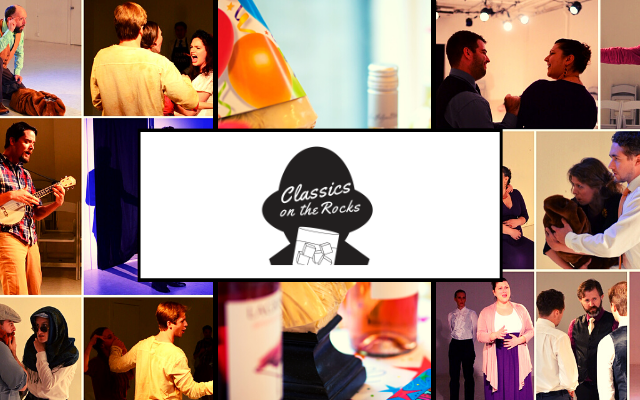Will: What Is He Good For?
At ”Will: What Is He Good For?” We seek to explore the question of who was the Real Shakespeare - who wrote his beautiful words - because understanding who he was can unlock the key to understanding his works and words in a new way. It also can help to inform the argument - who is he for? Is Shakespeare an old relic - only the academics, those of his time, and the cultural “elite.” Or is he indeed for everyone who wants to know and experience his plays? Throughout our series, we’ll explore the Man from Stratford’s life, history, and explore textual clues that will prove who owns Shakespeare’s words, relevance, and most importantly his legacy.
At ”Will: What Is He Good For?” We seek to explore the question of who was the Real Shakespeare - who wrote his beautiful words - because understanding who he was can unlock the key to understanding his works and words in a new way. It also can help to inform the argument - who is he for? Is Shakespeare an old relic - only the academics, those of his time, and the cultural “elite.” Or is he indeed for everyone who wants to know and experience his plays? Throughout our series, we’ll explore the Man from Stratford’s life, history, and explore textual clues that will prove who owns Shakespeare’s words, relevance, and most importantly his legacy.
Episodes
Wednesday Feb 11, 2026
Season 4, Episode 3: From Scattered to Sorted(?)
Wednesday Feb 11, 2026
Wednesday Feb 11, 2026
After the chaos of the 1619 “False Folio,” Shakespeare’s friends John Heminges and Henry Condell decided enough was enough. If anyone was going to collect Will’s plays properly, it would be the men who’d spent over twenty years in the trenches with him.
In this episode, we trace their likely first steps, from digging through the King’s Men’s prompt books and cue scripts to tracking down the “good” quartos of Hamlet and Romeo and Juliet. Along the way: bootlegs, brand management in the 1590s, and the thorny business of negotiating publishing rights in a world without copyright as we know it.
They pulled off the unthinkable and gathered the plays. But collecting them was only half the battle.
Wednesday Dec 17, 2025
Season 4, Episode 2: Quartos and Chaos
Wednesday Dec 17, 2025
Wednesday Dec 17, 2025
After Shakespeare’s death, his plays didn’t immediately become sacred texts, they became commodities. In this episode, we dive into the publishing chaos of the early 1600s, where bad quartos, cash grabs, and loose copyrights threatened to fracture his legacy. Enter John Heminges and Henry Condell, two friends determined to wrestle Shakespeare’s work back from the mess. Along the way, we unpack how Ben Jonson’s audacious move to publish his own complete works, the original literary box set, helped light the fuse.
Wednesday Nov 05, 2025
Season 4, Episode 1: The End of the Road
Wednesday Nov 05, 2025
Wednesday Nov 05, 2025
By 1609, William Shakespeare had been writing plays for nearly two decades. He was a household name in London, his company—now the King’s Men—enjoyed royal patronage, and their new indoor stage at Blackfriars promised a fresh era of theatrical success. By all accounts, Shakespeare was still at the height of his career.
But behind the curtain, things were shifting. The endless grind of plague closures had slowed his output. His family life was changing—his daughter Susanna married, his mother passed, his first grandchild was born. And in his plays, we see something else: a tone that grows more experimental, more reflective, even more personal than before. Fathers soften. Endings grow stranger. And Shakespeare himself seems to be stepping back, handing the reins to younger playwrights, and perhaps preparing for retirement.
In this episode, we explore the final stretch of Shakespeare’s career: from the collaborative experiments of Timon of Athens and Pericles, to the intimate revelations of the Sonnets, and finally, to his last solo masterpiece, The Tempest—a play that reads like his farewell to the stage. We’ll also meet the rising talent John Fletcher, soon to become Shakespeare’s partner in his last works, and learn how the fire that consumed the Globe in 1613 symbolized the end of an era.
And then, silence. By 1616, Shakespeare is gone. But his words are not. The question is: how would those words survive? And who would ensure they reached us?
Sunday Sep 28, 2025
Season 4, Teaser: Will: What Is He Good For? - The First Folio
Sunday Sep 28, 2025
Sunday Sep 28, 2025
Shakespeare’s death in 1616 could have meant the loss of his words forever. Many of his plays existed only in fragile manuscripts and cheap, error-filled quartos. Then, seven years later, two of his fellow actors—John Heminges and Henry Condell—took on the monumental task of preserving their friend’s work.
Their project became the First Folio of 1623: the first collected edition of Shakespeare’s plays. Without it, we would have no Macbeth, no Twelfth Night, no The Tempest. With it, Shakespeare’s reputation leapt from playwright of his time to literary giant for all time.
Season 4 of Will: What Is He Good For? uncovers the story of the First Folio: how it was assembled, why it mattered, and how one book turned Shakespeare into a legend whose words continue to shape our world four centuries later.
Saturday Aug 16, 2025
He Had a Blank Space (Baby)
Saturday Aug 16, 2025
Saturday Aug 16, 2025
In the Season 3 finale of Will: What is He Good For? we explore how Shakespeare’s writing was shaped not only by the theaters and venues where his plays were performed, but also by the monarchy and the shifting tastes of his audiences.
We trace his evolution from writing for traveling troupes—where simple staging and minimal sets were a necessity—to the grandeur of the Globe, where plays like Much Ado About Nothing, As You Like It, and Hamlet thrived on the energy of large, dynamic spaces. Later, with access to the more intimate Blackfriars Theatre, Shakespeare experimented with subtler staging and more introspective storytelling, giving us works like The Winter’s Tale and The Tempest.
Across these spaces, Shakespeare’s characters and stories grew in depth and complexity, reflecting not just his genius but also the demands and opportunities of the stage.
To close the season, we ask: who really shaped Shakespeare? Was it the patronage and influence of monarchs like Elizabeth I and James I, the performance spaces that demanded new styles of writing, or was it simply Shakespeare’s unmatched ability to tune into his world and transform it into timeless art?
Tuesday Feb 04, 2025
We Believe, the Children are our Future
Tuesday Feb 04, 2025
Tuesday Feb 04, 2025
Along with the adult acting troupes, such as the Queen's Men, there was another genre of acting troupes that influenced Shakespeare and his writing. Children's, or boy acting troupes and their rise in popularity caught Shakespeare's attention and caused him to elevate his writing.
Tuesday Jan 14, 2025
Season 3, Episode 2: Not the Billing, The Bill.
Tuesday Jan 14, 2025
Tuesday Jan 14, 2025
On February 2nd in 1585, Shakespeare signs a baptismal certificate for his twin children Judith and Hamnet. This is the last record we have of what he is doing for the next seven years and beginning what scholars call his “lost years” There are many, many theories of what he was doing during this time. In this episode, we explore the story of William Knell and the Queen’s Men, and how it may shed some light on the unexpected journey the young man from Stratford would ultimately embark on.
Sunday Dec 22, 2024
Season 3, Episode 1: Now, That's Entertainment
Sunday Dec 22, 2024
Sunday Dec 22, 2024
This season, we're taking a deeper look at the evolving theatre scene of the 1500-1600s and how the way plays were produced influenced what ended up in the final texts we have of William Shakespeare. In our first episode, we explore one of the earliest influences on the young Bard: traveling and touring theater companies. Listen in to learn more about the types of productions being produced in the late 1500s and the way those touring productions shaped the written texts we know today.

About Your Hosts
William Downes
Founder, Artistic Director | Classics on the Rocks
Prior to founding the NYC based theater company, Classics on the Rocks, William Downes spent years honing his craft in and around New York City. He's had the honor of playing some of Shakespeare's most delightful clowns such as Dogberry (Much Ado About Nothing) Dromio of Syracuse (Comedy of Errors) Touchstone (As You Like It) and Launce (Two Gentlemen of Verona). On the more serious side, he's played such intricate roles as Macbeth (MacBeth) Othello (Othello) Roderick (Double Falsehood) and Petruchio (Taming of the Shrew) He also teaches master classes on the use of cue scripts, and First Folio acting technique. In addition to his work with Classics on the Rocks, he does private verse and text coaching.
Victoria Wood
Associate Director | Classics on the Rocks
After graduating with her BFA from Emerson College, Victoria returned home to New York to be a part of the classical theatre scene. After playing such roles as Viola (Twelfth Night), Mistress Ford (The Merry Wives of Windsor), Lady MacDuff (Macbeth), Nerrissa (The Merchant of Venice) and Puck (A Midsummer Night’s Dream), she also received her Masters of Public Administration at Baruch College. Victoria has been directing and co-producing classes and performances with Classics on the Rocks since 2014.

About Classics on the Rocks
Classics on the Rocks is a NYC-based ensemble acting company founded in 2013. At Classics on the Rocks, we believe that just as whiskey doesn't need anything more than rocks to tame its bite, Shakespeare doesn't need fancy concepts, modernizations, frilly costumes, or big sets to make it relatable. All you need are talented actors who trust the text and tell the story.
Our mission is to create a warm, friendly environment where actors and audience can come together and experience classical theatre in an easily accessible, and engaging way. Learn more at www.classicsontherocks.org



